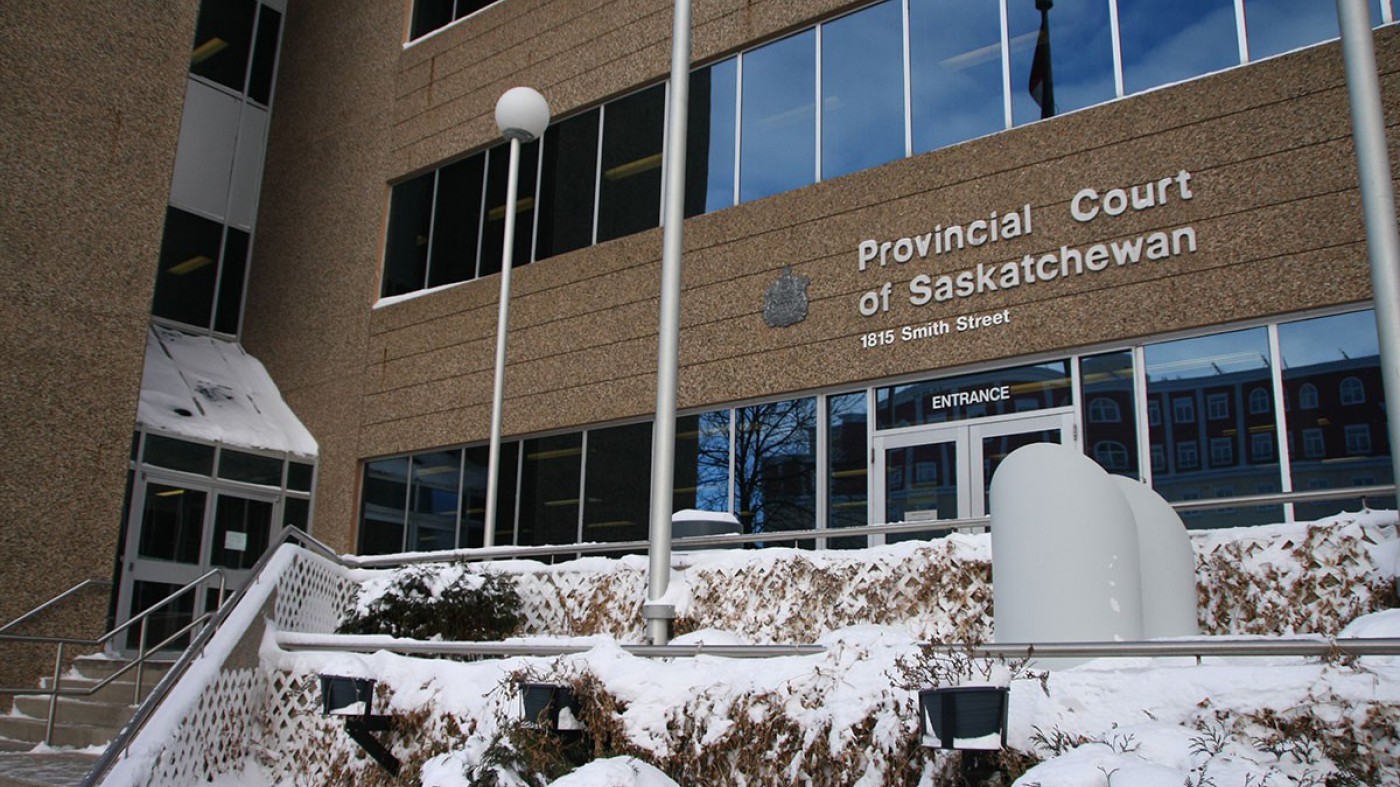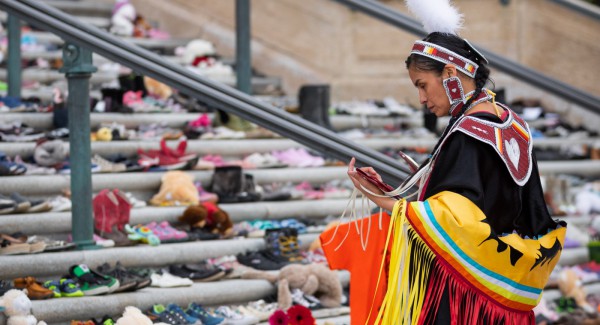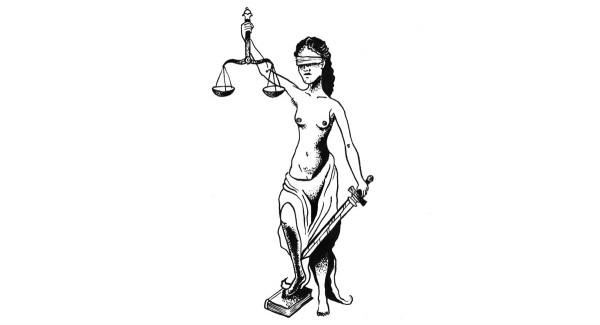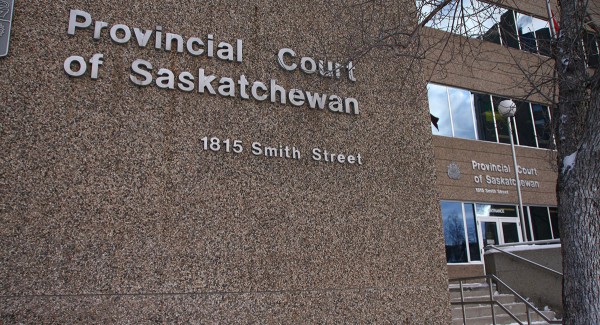Youth access to justice

Julia Peterson
At 10 a.m. on any given weekday, most children and teenagers in Saskatchewan will be in class, maybe doing a worksheet of math problems or waiting for the recess bell. But in the grey courthouse building in downtown Regina, youth court is also in session, and it moves fast. One of the first cases up on one November morning was for a currently incarcerated boy who spent his few minutes in the courtroom giving a thumbs-up to people in the gallery while his lawyer, the prosecutor, and Judge Doug Kovatch quickly negotiated a change to his trial date.
The next defendant called that morning was a teenage girl who didn’t have a lawyer. She barely answered any questions the judge put to her, even about her biographical details or another issue she was involved in that was currently in mediation – instead she was shivering, crying, and repeatedly asking if she could go to Legal Aid. After setting a date for the teenager to return to court, the judge advised her that Legal Aid would probably turn down her request for help, since these charges did not carry a risk of jail time.
After her came a young man, also without a lawyer, who had violated one of his parole conditions by missing a class he was scheduled to take at the Gabriel Dumont Institute, which promotes Métis culture by delivering Métis-specific educational programs and services. As he explained to the judge and prosecutor, he thought he had cleared the missed class with his probation officer, and once he realized that there might be a problem, he immediately re-enrolled in the course. He came prepared with a red Duo-Tang full of proof that he was still attending class and kept trying to explain the issue, but the judge said that he would have to come back to court so they could re-evaluate the issue once the class was complete.
Across the country, Indigenous youth continue to be over-represented in the prison system, making up 43 per cent of admissions to correctional services in 2017/18 despite constituting less than 10 per cent of the youth population.
In 2017/2018, over 27,000 cases – with charges ranging from fraud, mischief, and drug possession to homicide and attempted murder – were tried in youth court in Canada, and about 50 per cent of the defendants in those cases were found guilty. Across the country, Indigenous youth continue to be over-represented in the prison system, making up 43 per cent of admissions to correctional services in 2017/18 despite constituting less than 10 per cent of the youth population. While youth incarceration rates are falling in Saskatchewan, the province still has the second-highest youth incarceration rates in the country, and not all young people have access to counsel who can guide them through the legal system. This can affect how well they are able to access justice.
“There’s always a clash between government services, community, and the person themselves around their capacity to access services – whether or not they have help with something as simple as remembering to go to a probation meeting, or not attending something socially that would put them in a breach [of parole conditions] where they’re not to be with a particular person, age group, or demographic,” says Street Culture Project CEO Kim Sutherland. Street Culture Project, which has been around since 1998, provides services for vulnerable Regina youth through peer homes, mentorship programming, work experience programs, and shelters. “We certainly get creative when we’re trying to help young people access services, specifically around justice, because it is very cold, very black and white, and they’re in a world with many colours, especially if addiction or consumption is also a factor. We have to connect them to reality and make sure they don’t inadvertently end up with more charges simply because they’re unable to manoeuvre their way through the justice system.”
According to a study published by researchers from the University of Toronto, over 90 per cent of youth in the Canadian criminal justice system experience some form of mental illness. This can create a vicious cycle, because incarceration can also make symptoms of mental illness worse, which can have major impacts on their future experiences in the court system.
“Very often, when I’m with a kid, I’ll say, ‘what are you going to court for?’ and they’ll say, ‘I’m not really sure,’” says Street Culture Project’s director of operations, Mike Gerrand. “It’s only one of many symptoms of crisis in their lives at any given time. When they have issues with addiction and mental health and no adult allies, and they may be developmentally behind where the average child may be, I think that plays in hugely [to how well they understand the justice system]. And then matters get worse as they start to turn 18, when they’ve got youth charges that now blend into the adult system that they’re still dealing with.”
“Very often, when I’m with a kid, I’ll say, ‘what are you going to court for?’ and they’ll say, ‘I’m not really sure.’”
Studies of Canadians with youth court convictions have found that up to 90 per cent of juvenile offenders were reconvicted as young adults aged 18 to 24.
In Saskatchewan, a young person who finds themselves as a defendant in a court case has a few possible options for information and advice. If they or their parents have the money to do so, of course, they can hire a lawyer. If they can’t afford a lawyer and are facing charges that carry the possibility of a prison term, Legal Aid may be able to represent them. However, if they can’t afford a lawyer but are facing charges that do not carry a risk of incarceration, they may not be represented in court at all, and this can lead to serious consequences.
“It’s not very common that a young person will be picked up for something and, when they’re in front of a judge at their first court appearance, they’re ready,” says Sutherland. “The process is usually held up several times, and the young person ends up having to get legal help. But it’s a very reactive process. The kids aren’t like you or me – if we face something, we immediately contact a lawyer and know our rights and get busy with it. They often have no adult allies who can guide them through the process, nor do they understand the seriousness, very often. And it’s confusing for them, because the length of time it takes to get through the judicial process is unbelievable. And if, as adults, we’re challenged with it, imagine being a kid where the charges are just stacking up – everything from new charges to breaches on old charges.”
While the Legal Aid website does note that “all youth are eligible for legal aid, regardless of the seriousness of their charges or their finances,” as I heard in youth court, at least some young defendants are being told otherwise, and no representatives from Legal Aid were available to comment on which is correct. Besides jail time, youth who are found guilty after a trial can face penalties such as being required to pay restitution to the victim, performing community service, and being put on probation. For adults, certainly, Legal Aid is clear that they will only provide full representation to low-income people who are facing jail time. Due to the program’s strict requirements and income cut-offs, over 30 per cent of low-income families in Saskatchewan would not be eligible for Legal Aid if they needed it.
"We have to connect them to reality and make sure they don’t inadvertently end up with more charges simply because they’re unable to manoeuvre their way through the justice system.”
Carly Romanow, a lawyer with the non-profit Pro Bono Law Saskatchewan, another organization that helps people access a lawyer if they are not able to pay, says that the court system can be mystifying for clients unfamiliar with the process, and this can lead to serious mistakes.
“Lots of times, there’s deadlines for filing documents, and missed deadlines can have pretty dire repercussions on the remainder of their legal arguments of what options they have available after a deadline,” she explains. “For example, some people don’t have regular phone numbers or regular addresses, so they’ll miss a hearing date. And appealing stuff is much more difficult than attending the regular hearing. People need to know how to not miss deadlines, what their next steps are, and how to prepare best for their case. If you don’t have that information, it can be very hard to deal with it once you’ve missed a step.”
Romanow says that, to fill the gap between the amount of direct representation non-profits can provide and the need for it here in Saskatchewan, groups including Pro Bono Law Saskatchewan have started putting their resources online. Legal non-profits in the province have had to be even more guarded in terms of their time since 2018, when Saskatoon Legal Aid staff were laid off as part of major organizational restructuring. Multiple positions were left unfilled, and over 3,000 recent arrest files were sent to private lawyers.
“It’s more expensive to put a person in a room with another person,” Romanow says. “So a lot of the way non-profits try to fill the gaps between government agencies is through legal information online. But lots of clients who do their own research [will find] a different jurisdiction or an American version of the information, and depending on what you’re dealing with, the laws can be quite specific to Saskatchewan. Being able to read at a certain level, being able to have consistent access to the internet, and then sorting through what pops up on a Google search can be really important to getting the reliable and appropriate legal information you need.”
Defendants with weaker or less experienced research skills who are relying on information compiled by non-profits face plenty of pitfalls that could have a serious impact on their lives. Dr. Marc Spooner, a professor in the faculty of education at the University of Regina, says that the types of research competencies youth need to navigate these sorts of questions are skills that students will work on throughout their schooling.
“In high school, they really start to develop these skills – looking at what’s the source? What’s the date? Who are they connected with? Who owns the website? Who’s producing it? Does it seem to jive with other information you’re reading from other sources you know to be credible?”
“It’s more expensive to put a person in a room with another person. So a lot of the way non-profits try to fill the gaps between government agencies is through legal information online."
However, these skills do not come overnight, and some young people may not have this classroom experience at all. A 2017 report by the Office of the Correctional Investigator found that only 21 per cent of the respondents in their survey of incarcerated young adults aged 18 to 21 had graduated from high school. Layton Burton, a parent of two sons now in their 20s, is doubtful that he and his children would have been able to find the right resources on their own had they been defendants in a youth court case.
“To be honest, I think [my sons] are probably only now at the point where they have the skills and the mindset to search for those answers themselves,” he says. “I only speak for my own children – not that they’re [incompetent], because they’re not – but there’s no way they would have had the wherewithal, even if they were told what to search for, to get all the right answers. Even with my help, as someone who is somewhat computer-savvy, that would worry me as a parent.”
The Saskatchewan Law Courts provide a website that, in plain language, explains some of what young people might need to know to navigate the court system – the main principles of the Youth Criminal Justice Act and the kinds of sentences that can be applied under the YCJA. The Government of Saskatchewan website also has a page for information on appearing in youth court, entering a plea, and sentencing. Unfortunately, as of February 10, 2020, that link is broken.
The Ministry of Justice says there are many resources to help young defendants in Saskatchewan’s courts.
“As appropriate in each case, Crown prosecutors try to ensure that the young people with whom they deal understand the prosecutor’s role, the court process, and are prepared to participate as required,” says the senior communications consultant for the Ministry of Justice and Attorney General, Jennifer Graham. “Of course, parents and relatives of young people, the police, Victim Services, court workers, defence lawyers, and others working in the justice system do the same within the bounds of their roles.”




